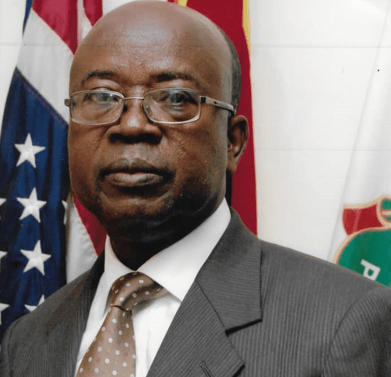By Kingsley LARBI (Rev. Prof.)
Rev. Prof. E.K. Larbi’s Born to Win is more than just a memoir; it’s a narrative of survival, spiritual awakening, and personal growth. In Chapter 14, titled My Experience in Nigeria, Larbi recounts his journey to Nigeria in 1981 in search of economic opportunities, only to find himself enveloped in a mixture of challenging and inspiring experiences.
This chapter not only gives us a window into his life but also reflects on the broader socio-political and economic challenges of West African immigrants at the time. From the corruption at border posts to the spiritual transformation he experienced, Larbi’s narrative is both a testament to resilience and a vivid portrayal of Nigeria in the early 1980s.
The Road to Nigeria: Corruption and Hope
In October 1981, Larbi embarked on a long and difficult journey from Accra, Ghana, to Lagos, Nigeria. His route, passing through Accra-Aflao/Lomé-Cotonou-Seme-Badagry, was marred by endless road checks and rampant corruption.
Larbi recalls the harrowing experience of bribery at the Seme-Badagry border, where immigration officials demanded money from travelers before granting them clearance. This practice had become so institutionalized that regular travelers and drivers were accustomed to it, though it was deeply unsettling to newcomers like Larbi.
This experience of corruption at the borders underscores the entrenched exploitation in Nigeria at the time, where even routine travel became a burden. It reflects a larger reality of the hardships faced by African travelers in search of better opportunities during that period.
While exact figures are difficult to come by, anecdotal evidence suggests that bribery at African borders was a common practice, affecting thousands of immigrants passing through these checkpoints daily.
Lagos and the Realities of Life in a Slum
Upon his arrival in Lagos, Larbi’s optimism quickly gave way to the harsh realities of life in one of Africa’s largest and most populous cities. His destination was Okobriki-Adenkule, a sprawling slum near Yaba, Lagos.
The size of his living quarters, an 8×8 feet wooden room, stood in stark contrast to the comfortable accommodations he had known in Ghana. He shared this space with Mr. Ansah Sasraku and his wife Cynthia, immigrants like him, struggling to survive in a foreign land.
What stands out in Larbi’s description of Okobriki-Adenkule is not just the physical discomfort but the complete lack of basic amenities. With no proper sanitation, residents of the slum were forced to use open fields for convenience, a demeaning experience for Larbi, who had previously lived in much more comfortable conditions. The shock of these living conditions is palpable, yet it was the reality for many immigrants and local Nigerians at the time.
Economic Hopes and Financial Losses
Like many immigrants, Larbi came to Nigeria in search of better economic opportunities. He found work at Coastal Services Nigeria Limited on Apapa Road, Lagos, earning a decent salary of about US$800 per month.
Yet, even in his moment of financial stability, Nigeria had more challenges in store for him. A pickpocket robbed him of his entire month’s salary, an event that left him devastated. This personal loss highlights the precariousness of life in Lagos, where crime was a constant threat for residents, especially immigrants unfamiliar with the terrain.
Despite this setback, Larbi found solace in his Christian fellowship at Coastal Services, where his colleagues helped raise funds to mitigate his financial loss. The kindness he experienced during this time stands in contrast to the harshness of his environment, emphasizing the importance of community and faith in navigating adversity.
Spiritual Transformation: The Role of the Church
While his financial losses in Nigeria were significant, Larbi’s spiritual gains were far greater. His introduction to the Foursquare Gospel Church in Yaba, Lagos, became a pivotal part of his journey. Along with his friends, including Michael Asiedu (later an Apostle in the Church of Pentecost Ghana) and Samuel Tawiah Assiamah, Larbi became deeply involved in the church. He admired the church’s organization, discipline, and professionalism, traits that set it apart from his previous experiences in Ghana.
The church’s influence extended beyond spiritual guidance; it introduced Larbi to a new way of thinking about faith and service. His exposure to religious literature from prominent American televangelists such as Oral Roberts and Kenneth Hagin fueled his desire to pursue full-time church ministry. It was this spiritual awakening that led him to apply for a theology degree at Oral Roberts University (ORU) in 1982, a decision that would shape his future.
The Hardships of Immigration and the Return Home
The spiritual benefits Larbi received in Nigeria were tempered by the country’s volatile political environment. In 1983, the Nigerian government ordered all aliens without valid resident permits to leave the country. This forced Larbi to leave behind his work and his spiritual community, flying back to Ghana on January 27, 1983. His exit from Nigeria was not just a physical departure but also the closing of a chapter filled with hardships, growth, and divine intervention.
Reflecting on the Nigerian Experience
The experiences Larbi narrates in Chapter 14 offer a powerful insight into the complexities of immigrant life in Nigeria during the early 1980s. From the pervasive corruption at border posts to the dilapidated living conditions in the slums of Lagos, Larbi’s story is one of survival in the face of adversity. Yet, amidst the challenges, his time in Nigeria also sparked a profound spiritual transformation, leading him to a deeper understanding of his faith and his calling.
Through the journey
- The Economic Challenges of West African Immigrants:
Many Ghanaians, like Larbi, traveled to Nigeria in search of economic opportunities, only to find that the path was fraught with difficulties. Corruption, crime, and inadequate living conditions were common, making the pursuit of financial stability incredibly challenging.
- The Importance of Community and Faith:
Despite these hardships, the role of community and faith was central to Larbi’s survival and growth. His involvement in the Foursquare Gospel Church and the support from his colleagues at Coastal Services were lifelines during his time in Nigeria.
- Spiritual Growth in Adversity:
Larbi’s experiences underscore the idea that spiritual growth often occurs in the most difficult circumstances. His exposure to the teachings of Oral Roberts and Kenneth Hagin, coupled with his involvement in the Foursquare Gospel Church, laid the foundation for his eventual pursuit of full-time ministry.
As Larbi reflects on his time in Nigeria, the narrative of Chapter 14 reminds us that even in the darkest moments, there is light. His journey through the challenges of life as an immigrant reveals a story of resilience, faith, and the transformative power of adversity.
Conclusion
Rev. Prof. E.K. Larbi’s experience in Nigeria was both challenging and spiritually enriching. Despite the numerous difficulties he faced, from corrupt border officials and squalid living conditions to financial losses and threats to his safety, Larbi emerged from his time in Nigeria with a renewed sense of purpose. His story serves as a powerful reminder that even in the face of adversity, personal and spiritual growth is possible.
Through faith, community, and perseverance, Larbi turned his hardships into lessons, eventually setting him on a path to theological education and ministry. Chapter 14 of Born to Win is a testament to the resilience of the human spirit and the transformative power of faith in times of trial.










